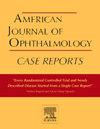Self-inflicted transorbital intracranial foreign body following ingestion of hallucinogenic psilocybin mushrooms
Q3 Medicine
引用次数: 0
Abstract
Purpose
Self-inflicted penetrating orbital trauma is a rare ophthalmologic emergency requiring timely intervention and neurological monitoring to identify and treat any possible intracranial complications and to prevent irreversible vision loss. This case report aims to describe a fatal case of self-inflicted ocular trauma following the consumption of psilocybin mushrooms, necessitating urgent multidisciplinary care by the ophthalmology and neurosurgery services.
Observations
A 21-year-old Hispanic male presented urgently to the emergency department (ED) after self-inflicted ocular trauma with a wood-cased pencil, which was embedded in the upper eyelid and transversed the left orbit, extending to the pons, as depicted on computed tomography (CT). Physical examination of the left eye was difficult due to the risk of displacement of the pencil within the brainstem and concern for further damage. The pencil was successfully removed via fluoroscopy-guided neuro-interventional catheterization and stenting. Following the removal of the foreign body, there was no apparent damage to the globe, and a canthotomy/cantholysis was performed due to increased retro-orbital pressure. The neurovascular damage sustained by the trauma led to a progressive neurological decline in the following days and, ultimately, a fatal outcome.
Conclusions and importance
With growing support in the literature for psilocybin and its therapeutic medicinal benefits for conditions such as depression and anxiety, this report details a case of self-inflicted trans-orbital trauma with brainstem injury following ingestion of this psychoactive hallucinogen along with the proper medical and surgical management.
服用致幻裸盖菇素蘑菇后自行造成的经眼眶颅内异物
目的:自行造成的穿透性眶外伤是一种罕见的眼科急症,需要及时干预和神经监测,以识别和治疗任何可能的颅内并发症,防止不可逆的视力丧失。本病例报告旨在描述一个致命的情况下,自己造成的眼外伤后,消费裸盖菇素蘑菇,需要紧急多学科护理的眼科和神经外科服务。一名21岁的西班牙裔男性,在用木盒铅笔造成眼部损伤后,被紧急送往急诊室(ED),木盒铅笔嵌入上眼睑,穿过左眼眶,延伸到桥状脑桥,如图所示(CT)。左眼的身体检查很困难,因为有脑干内铅笔移位的风险,并担心进一步的损伤。通过透视引导下的神经介入导管置入术和支架置入术成功地取出了铅笔。异物取出后,眼球未见明显损伤,由于眶后压力增加,行眦切开术/眦松解术。创伤造成的神经血管损伤在接下来的几天里导致了神经功能的逐渐衰退,最终导致了致命的后果。结论和重要性随着越来越多的文献支持裸盖菇素及其对抑郁和焦虑等疾病的治疗作用,本报告详细介绍了一例在摄入这种精神活性致幻剂以及适当的医疗和外科治疗后自行造成的跨眶创伤和脑干损伤。
本文章由计算机程序翻译,如有差异,请以英文原文为准。
求助全文
约1分钟内获得全文
求助全文
来源期刊

American Journal of Ophthalmology Case Reports
Medicine-Ophthalmology
CiteScore
2.40
自引率
0.00%
发文量
513
审稿时长
16 weeks
期刊介绍:
The American Journal of Ophthalmology Case Reports is a peer-reviewed, scientific publication that welcomes the submission of original, previously unpublished case report manuscripts directed to ophthalmologists and visual science specialists. The cases shall be challenging and stimulating but shall also be presented in an educational format to engage the readers as if they are working alongside with the caring clinician scientists to manage the patients. Submissions shall be clear, concise, and well-documented reports. Brief reports and case series submissions on specific themes are also very welcome.
 求助内容:
求助内容: 应助结果提醒方式:
应助结果提醒方式:


